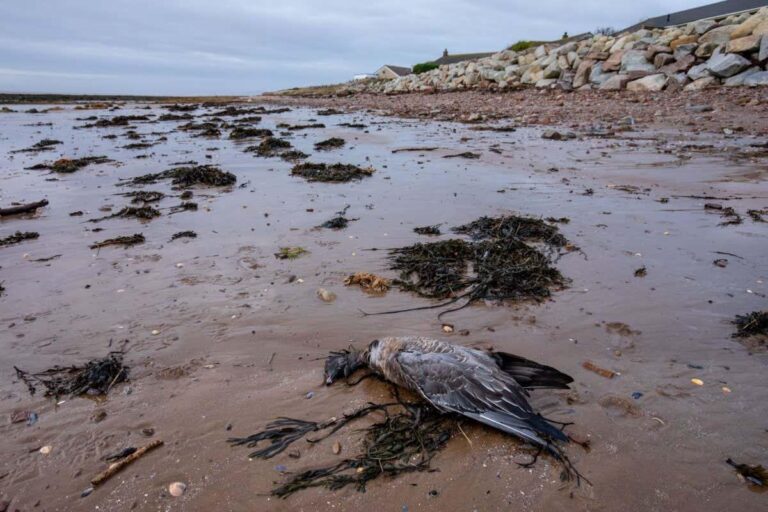Avian Influenza Identified in Wild Bird Sparks Nationwide Monitoring in Brazil
Brazilian authorities have officially confirmed the presence of avian influenza virus in a wild bird, igniting concerns about the potential transmission to commercial poultry farms across the country. In response, the Ministry of Agriculture has launched an extensive surveillance initiative targeting both wild and domestic bird populations within critical regions to curb further spread. This rapid mobilization underscores Brazil’s dedication to protecting its vital poultry sector as well as native wildlife.
Alongside these monitoring efforts, investigations are underway at a nearby commercial poultry operation where preliminary signs suggest possible infection. The ongoing inquiry focuses on several key strategies:
- Intensified diagnostic testing protocols for early detection among farmed birds.
- Restrictions on movement of live birds and related products within affected areas.
- Collaboration with environmental agencies to analyze migratory patterns that may influence viral spread.
- Community outreach programs, educating farmers and local residents on enhanced biosecurity practices.
| Region | Surveillance Phase | Samples Collected |
|---|---|---|
| Amazonas | Active Monitoring | 120 samples |
| Mato Grosso | Completed Surveillance << tdstyle=" padding : 10 px ;border : 1 pxsolid# ddd ;" >95 samples< / td > < / tr > < tr > << tdstyle=" padding : 10 px;border :  solid# ddd ;" > Paraná< / td > << tdstyle=" padding :  solid# ddd ;" > Ongoing Monitoring< / td > << tdstyle=" padding :  solid# ddd ;" >110 samples< / td > < / tr > | |
| Mato Grosso do Sul | Completed Surveillance | 95 samples |
The surveillance program continues to expand as authorities gather more data from various ecosystems known for hosting migratory birds that could act as vectors for avian influenza viruses.
Investigation at Commercial Poultry Farm Intensifies Amid Avian Flu Concerns
The recent confirmation of avian influenza in wildlife has prompted Brazilian health officials to intensify their examination of a commercial poultry farm situated near the initial detection site. The farm is currently under stringent biosecurity measures designed to prevent any cross-contamination between wild and domestic birds. Continuous sampling and health assessments are being conducted not only on this farm but also neighboring facilities within a defined radius.
Main actions underway include:
- Tightened inspections focusing on flock health indicators;
- If necessary, humane culling procedures will be implemented promptly;
- A series of advisories issued for farmers highlighting early symptoms such as sudden drops in egg production or respiratory distress;
- Liaison with global animal health organizations ensures up-to-date information sharing and coordinated responses.
| Parameter Monitored | Current Status | Upcoming Steps | |||
|---|---|---|---|---|---|
| Samples Taken from Birds (Wild & Domestic) | 150 collected so far | Awaiting laboratory analysis results | |||
| Number of Farms Under Observation | 3 farms receiving weekly visits by veterinary teams | ||||
| Wildlife Species Being Tracked (including migratory waterfowl) | 20 species monitored continuously | ||||
Strengthening Biosecurity Protocols Critical for Protecting Brazil’s Poultry Industry from Avian Influenza Spread
Poultry experts emphasize that rigorous implementation of biosecurity measures remains paramount following this recent outbreak alert. Recommended practices include thorough cleaning regimens involving disinfection of all equipment, vehicles entering farms, limiting access strictly to essential personnel only, alongside effective deterrence strategies against wild bird intrusion around farming sites-measures proven effective during previous outbreaks globally including those reported recently across Southeast Asia where similar strains caused significant losses exceeding $500 million USD annually according to FAO reports (2023).
An equally important aspect highlighted by specialists is prompt reporting mechanisms enabling immediate containment actions upon suspicion or confirmation-delays can exacerbate viral dissemination risking entire regional flocks which contribute substantially not just domestically but also through exports valued at billions annually.
Below is an overview table summarizing critical recommended steps:
Recommended Action
Objective/Purpose
Conclusion and Ongoing Efforts Amid Bird Flu Vigilance in Brazil
The Brazilian government remains vigilant following the discovery of avian influenza within its borders among wildlife populations. Active investigations continue into suspected cases affecting commercial operations with strict adherence enforced regarding biosecurity protocols nationwide.
Authorities urge all stakeholders-from smallholder farmers up through large-scale producers-to maintain heightened awareness while cooperating fully with regulatory bodies.
Further updates will be provided as laboratory results emerge and containment strategies evolve accordingly ensuring protection both locally and internationally against this persistent threat.
Poultry experts emphasize that rigorous implementation of biosecurity measures remains paramount following this recent outbreak alert. Recommended practices include thorough cleaning regimens involving disinfection of all equipment, vehicles entering farms, limiting access strictly to essential personnel only, alongside effective deterrence strategies against wild bird intrusion around farming sites-measures proven effective during previous outbreaks globally including those reported recently across Southeast Asia where similar strains caused significant losses exceeding $500 million USD annually according to FAO reports (2023).
An equally important aspect highlighted by specialists is prompt reporting mechanisms enabling immediate containment actions upon suspicion or confirmation-delays can exacerbate viral dissemination risking entire regional flocks which contribute substantially not just domestically but also through exports valued at billions annually.
Below is an overview table summarizing critical recommended steps:
| Recommended Action | Objective/Purpose |
|---|---|
Conclusion and Ongoing Efforts Amid Bird Flu Vigilance in Brazil
The Brazilian government remains vigilant following the discovery of avian influenza within its borders among wildlife populations. Active investigations continue into suspected cases affecting commercial operations with strict adherence enforced regarding biosecurity protocols nationwide.
Authorities urge all stakeholders-from smallholder farmers up through large-scale producers-to maintain heightened awareness while cooperating fully with regulatory bodies.
Further updates will be provided as laboratory results emerge and containment strategies evolve accordingly ensuring protection both locally and internationally against this persistent threat.




